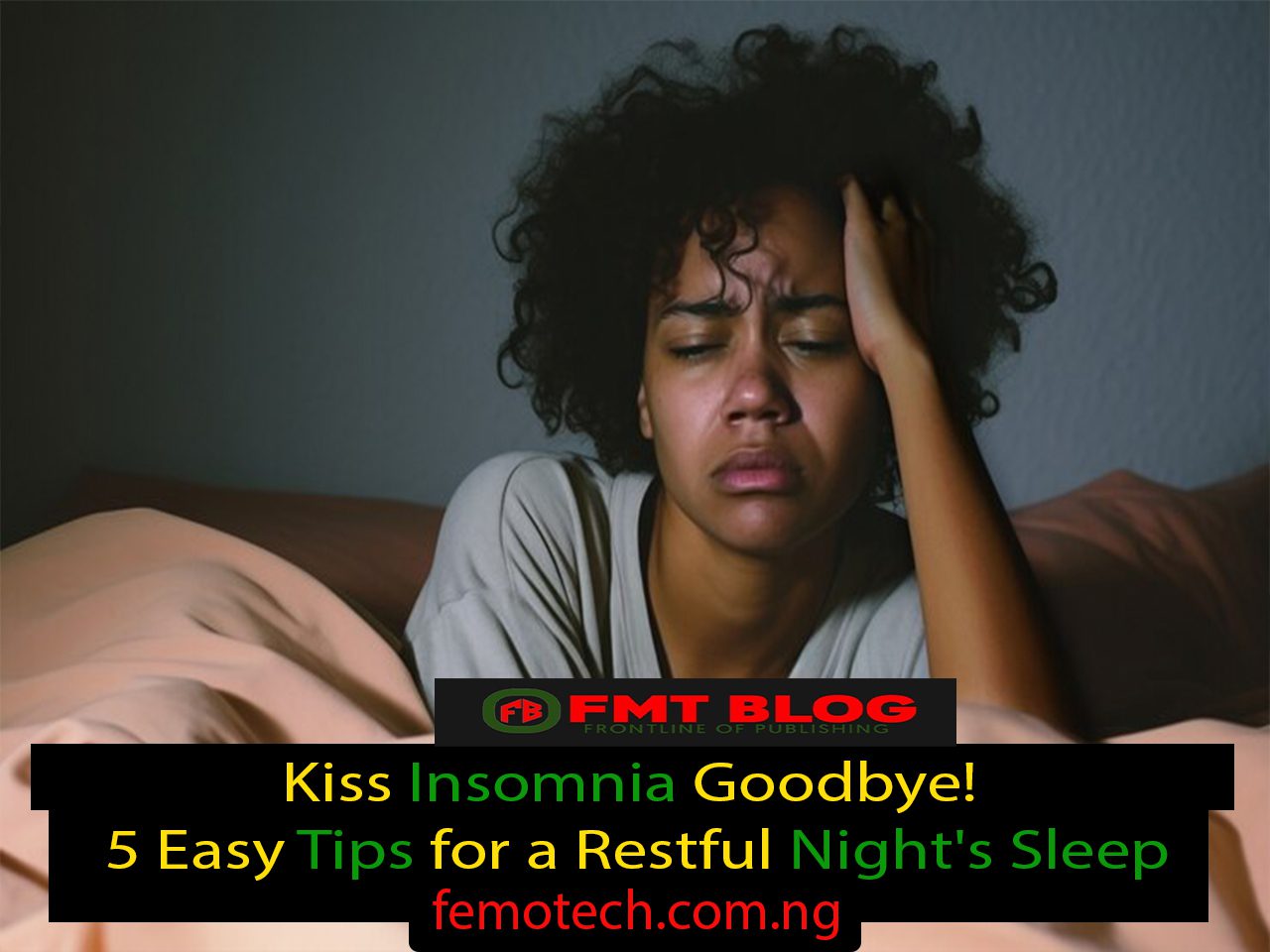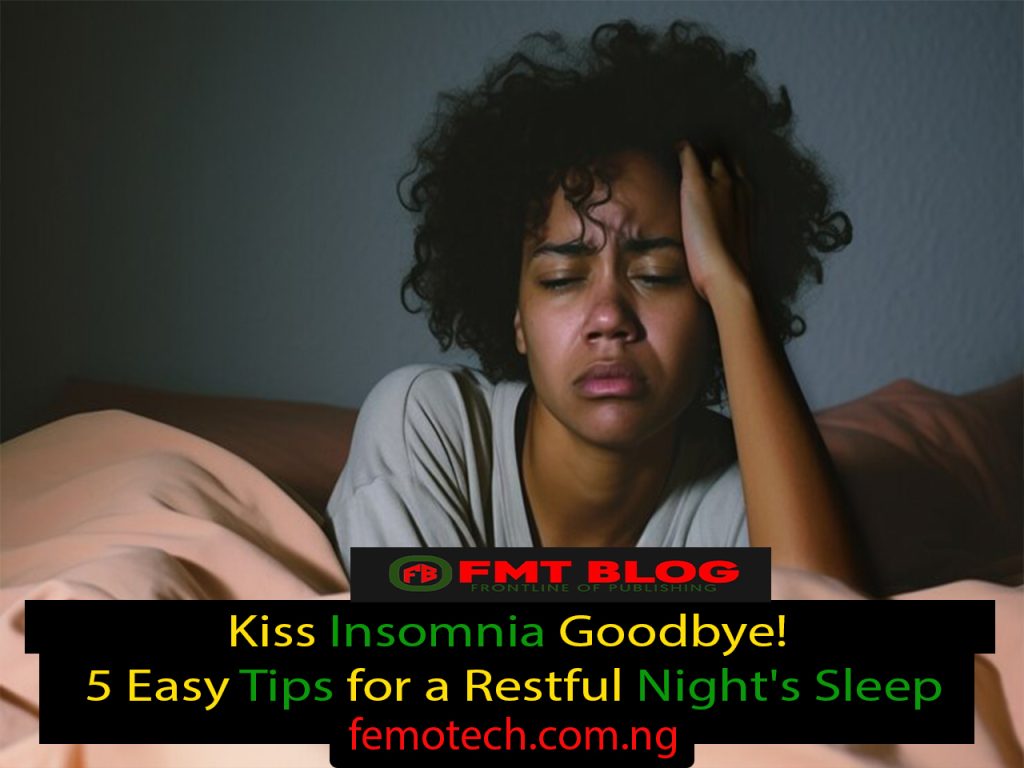
Insomnia got you down? Don’t stress! These simple tricks will help you conquer insomnia and wake up feeling refreshed.

Introduction
Insomnia, often referred to as the silent thief of the night, is a sleep disorder that plagues millions of individuals worldwide. It’s characterized by difficulty falling asleep, staying asleep, or both, leading to inadequate rest and daytime fatigue. Insomnia isn’t just a fleeting bout of sleeplessness; it’s a chronic condition that can significantly impact one’s quality of life. While occasional sleep disturbances are normal, persistent insomnia can disrupt your ability to function during the day, affecting your mood, concentration, and overall well-being.
How to Beat Insomnia
Reduce stress
When you’re stressed, you can’t sleep because it keeps you up and makes you nervous. It’s because our bodies are set up to be alert when we’re worried. To overcome this, try not to check work emails, watch the news, or use your phone at least an hour before bed. This will help you relax and let your body know it’s time to rest. Electronics give off blue light that can make it harder to fall asleep because your brain thinks it’s still daylight.
Instead, make a plan for going to bed that helps you relax. Take a warm bath with some calming lavender essential oil, or curl up with a good book (avoid anything too exciting like a mystery novel!). Do some gentle yoga moves or stretches, or play some serene music. The key is to find activities that help you quiet your mind and melt away the day’s worries. If you find your mind racing with thoughts and worries, try writing them down in a journal. Getting them out of your head can help you clear your thoughts and prepare for sleep.
Comfortable sleeping environment
Try as much as possible to ensure that your bed is comfortable. Try to get some comfortable pillows, cozy blankets, and blackout curtains to create a cool, dark, and inviting sleep environment. Here are some extra tips to make your bed a sleep sanctuary:
The Right Mattress: Believe me, the foundation of your sleep sanctuary is a very comfortable mattress that provides proper support for your body. Depending on your personal choice, some may like a soft, plush mattress, but the mattress should cradle your body and keep your spine aligned. If your mattress is sagging, lumpy, or more than 7–10 years old, it might be time for a new one.
Supportive Pillows: Supportive pillows are another important consideration. Pillows are essential for keeping your head, neck, and shoulders in proper alignment throughout the night. The right pillow depends on your sleep position. Back sleepers typically need a thinner pillow, while side sleepers need a thicker pillow to fill the gap between their ear and shoulder. Stomach sleepers might not need a pillow at all, or a very thin one.
Light: Darkness is essential for sleep production. Make sure you block out any light from outside sources with blackout curtains or an eye mask. This includes covering up any blinking lights from electronics, such as alarm clocks or charging devices.
Keep Your Bed for Sleep
Most people have turned their bed into a multi-purpose zone, which shouldn’t be. They turn it to where they eat, work on laptops, watch TV, or scroll through social media pages. In order to beat insomnia, you have to stop all these activities because they can actually make it harder to fall asleep. Keep your bed for sleep and other fun stuff that leads to sleep (you know what I am talking about).
Avoid alcohol and coffee.
While a glass of wine or beer might seem like a way to relax before bed, alcohol actually affects your sleep quality. Alcohol can make you sleepy at first, but it prevents you from reaching the deep, restorative stages of sleep that are important for feeling refreshed in the morning. In fact, as the night goes on, the effects of alcohol wear off and can lead to fragmented sleep, causing you to wake up more frequently throughout the night.
The same goes for coffee. That afternoon coffee or evening cup of tea may give you an energy boost, but the effects of caffeine can last for hours. Caffeine is a stimulant that can interfere with your ability to fall asleep and stay asleep. If you’re struggling with insomnia, it’s best to avoid caffeine in the afternoon and evening. Even if you don’t feel jittery after that cup of coffee, the caffeine could still be affecting your sleep.
Avoid eating a heavy meal right before bedtime
The way our bodies are designed is to break down and digest food in the hours before bedtime. Eating a heavy meal or sugary snacks right before bed can make it harder to fall asleep and stay asleep for a few reasons:
- When you eat a heavy meal close to bedtime, your digestive system has to work overtime to break down the food. This process can keep you awake and uncomfortable.
- Sugary snacks can cause a rise in your blood sugar levels, followed by a drop. This process can break your sleep cycle and make it harder to stay asleep.
- Spicy or greasy foods can cause heartburn or indigestion, which can be very uncomfortable and keep you awake at night.
Follow us on socials → Telegram | X/Twitter | Facebook | WhatsApp |WhatsApp Channel |Mobile App
Conclusion
Now that we have looked in to ways to combat insomnia, it is very important to constantly follow the tips we have discussed in order to be victorious and enjoy a good night rest. I want you to always have it in mind that a good night sleep is key to feeling your best.



